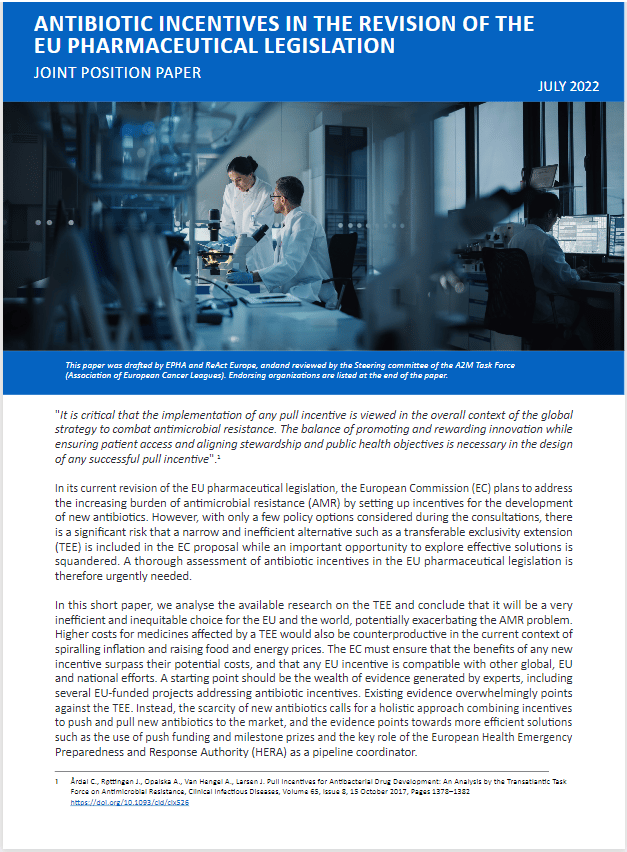In its current revision of the EU pharmaceutical legislation, the European Commission (EC) plans to address the increasing burden of antibiotic resistance (AMR) by setting up incentives for the development of new antibiotics.
With increasing antimicrobial resistance, the lack of new antibiotics is a major global public health problem. However, with only a few options considered during the targeted consultations of the pharmaceutical legislation revision, there is a high risk that the transferrable exclusivity extension (TEE) is included in the EC proposal despite being a narrow and inefficient option. A TEE would provide a company that brings a new antimicrobial to the market with a transferable right, allowing it to extend the exclusivity period for another product. This right could also be sold to another company. As appealing as it might be for the European policymakers inasmuch as the voucher will not require any upfront payments, existing evidence overwhelmingly points against creating a TEE.
In this short paper, we reviewed existing evidence and found 10 reasons that make a TEE a very inefficient and unequal choice for the EU and the world :
- It will create additional excessive social costs, which will directly affect European patients and national payers.
- It is ethically questionable as one therapeutic area will be subsidized at the expense of another
- It presents significant risks of overcompensation and disproportional reward for drug developers.
- It will cause additional problems of predictability of financing for EU healthcare systems.
- It would primarily favour large companies and only secondarily small and medium enterprises (SMEs).
- It risks allowing a weak link between the value of innovation and its rewards
- It does not ensure patients’ access to the new antibiotic brought to market
- It does not consider the availability of viable compounds in the pipeline in early discovery and development to actually “pull” from.
- It does not inherently ensure obligations of stewardship and appropriate use and would require that conditions and compliance stipulations be attached to the voucher to ensure appropriate use.
- It will set a bad precedent and can lead to huge social costs outside of the EU.
The EC should ensure that the benefits of any new incentive created by the pharmaceutical legislation surpass their potential costs. Rather than a socially costly and inefficient market incentive, recent EU-funded projects have identified the use of milestone prizes and the role of the EU HERA as a “pipeline coordinator” to shape and speed up the development of new antibiotics as more efficient alternatives1. Bearing in mind that the lack of access to antibiotics kills ten times more people than resistance to antibiotics, the main goal of the revision should be to facilitate the development of new antibiotics in the most efficient way
CONTACTS
Rosa Castro, Senior Policy Manager for Healthcare Delivery – EPHA | rosa.castro@epha.org
Kerstin Åkerfeldt, Policy Expert – ReAct Europe | kerstin.akerfeldt@medsci.uu.se
Andrea Caputo, Global Health Advisor – ReAct Europe | andrea.caputo@medsci.uu.se

